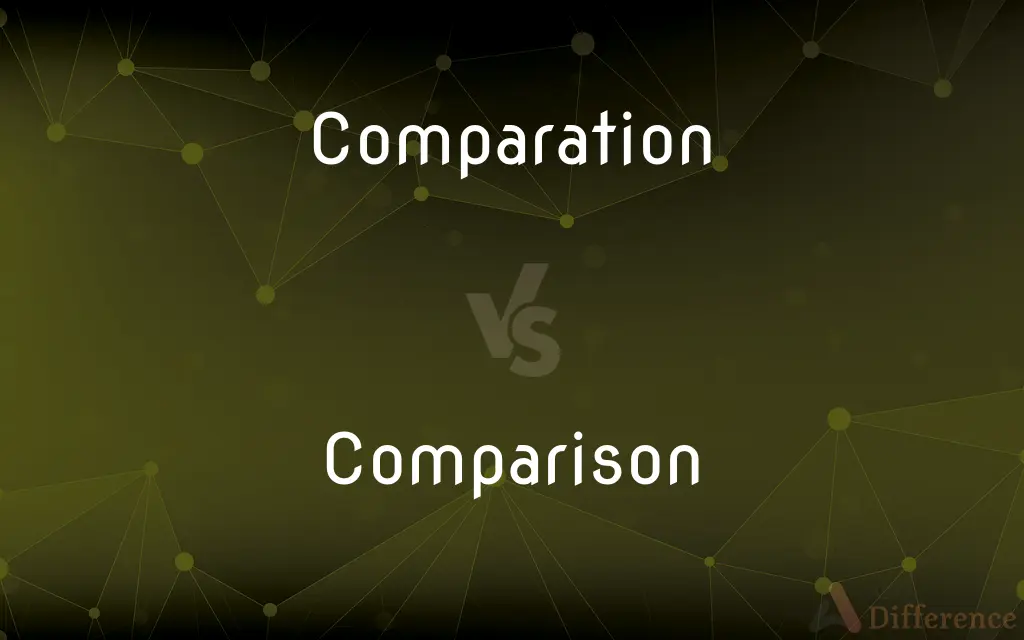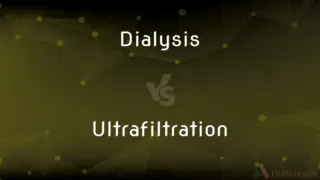Comparation vs. Comparison — What's the Difference?
By Tayyaba Rehman — Updated on October 20, 2023
"Comparation" is an outdated or less common term referring to the act of comparing, while "Comparison" is the widely accepted modern term denoting the act of comparing or the state of being compared.

Difference Between Comparation and Comparison
Table of Contents
ADVERTISEMENT
Key Differences
Comparation is a term that, while once might have been in more regular use, is now largely archaic and has been replaced in most contexts by the term Comparison. The latter is the widely recognized and contemporary word used to describe the act of comparing two or more entities.
In the context of linguistics, Comparation might be used to denote the grammatical process of forming the comparative and superlative degrees of adjectives and adverbs. Comparison, on the other hand, encompasses a broader range of activities, from everyday observations to scientific analysis.
Comparison is versatile, used both in everyday language and in specialized fields like science, literature, and mathematics. The word describes an act that is fundamental to human cognition. Comparation, in contrast, is not as versatile and is often seen as a more limited or niche term.
Many might not recognize or understand the term Comparation due to its diminished use, while Comparison is universally recognized and understood, given its widespread application in various fields and contexts.
Both terms originate from the Latin word "comparare," meaning "to pair together or match." While Comparison has retained its relevance and ubiquity over time, Comparation has faded and is less common in modern English usage.
ADVERTISEMENT
Comparison Chart
Usage
Archaic or less common
Widely accepted and used
Context
Often linguistic, pertaining to degrees of words
General act of comparing in various contexts
Recognition
Not universally recognized
Universally recognized and understood
Origin
From Latin "comparare"
From Latin "comparare"
Scope
Narrower, specific contexts
Broad, used in diverse fields and situations
Compare with Definitions
Comparation
An old term referring to the act of comparing.
His comparation of the two artifacts was detailed.
Comparison
An analogy or metaphorical illustration.
The poet's comparison of love to a rose was evocative.
Comparation
The process of determining relative degrees.
She was intrigued by the linguistic comparation in the text.
Comparison
The state of being compared.
His work stands in comparison to the greats.
Comparation
A rarely used synonym for comparison.
The comparation between the two studies was enlightening.
Comparison
The act or process of comparing.
The comparison between the two novels revealed distinct themes.
Comparation
A linguistic procedure forming comparative degrees.
The comparation of adjectives in Latin is complex.
Comparison
A consideration of similarities or differences.
Upon comparison, the newer model is more efficient.
Comparation
An outdated method of evaluation or judgment.
His skills in comparation were appreciated in the antique appraisal.
Comparison
The act of comparing or the process of being compared.
Comparation
A making ready; provision.
Comparison
A statement or estimate of similarities and differences.
Comparation
(obsolete) A making ready; provision.
Comparison
The quality of being similar or equivalent; likeness
No comparison between the two books.
Comparation
(nonstandard) Comparison.
Comparison
(Grammar) The modification or inflection of an adjective or adverb to denote the positive, comparative, and superlative degrees, as in English, along with the equative degree in certain other languages, such as Irish Gaelic.
Comparison
The act of comparing or the state or process of being compared.
To bring a thing into comparison with another;
There is no comparison between them
Comparison
An evaluation of the similarities and differences of one or more things relative to some other or each other.
He made a careful comparison of the available products before buying anything.
Comparison
With a negation, the state of being similar or alike.
There really is no comparison between the performance of today's computers and those of a decade ago.
Comparison
(grammar) A feature in the morphology or syntax of some languages whereby adjectives and adverbs are inflected to indicate the relative degree of the property they define exhibited by the word or phrase they modify or describe.
In English, adjectives and adverbs have three forms when making a comparison: the plain form "hot", the comparative form "hotter", and the superlative form "hottest".
Comparison
That to which, or with which, a thing is compared, as being equal or like; illustration; similitude.
Comparison
(rhetoric) A simile.
Comparison
(phrenology) The faculty of the reflective group which is supposed to perceive resemblances and contrasts.
Comparison
The act of comparing; an examination of two or more objects with the view of discovering the resemblances or differences; relative estimate.
As sharp legal practitioners, no class of human beings can bear comparison with them.
The miracles of our Lord and those of the Old Testament afford many interesting points of comparison.
Comparison
The state of being compared; a relative estimate; also, a state, quality, or relation, admitting of being compared; as, to bring a thing into comparison with another; there is no comparison between them.
Comparison
That to which, or with which, a thing is compared, as being equal or like; illustration; similitude.
Whereto shall we liken the kingdom of God? Or with what comparison shall we compare it?
Comparison
The modification, by inflection or otherwise, which the adjective and adverb undergo to denote degrees of quality or quantity; as, little, less, least, are examples of comparison.
Comparison
A figure by which one person or thing is compared to another, or the two are considered with regard to some property or quality, which is common to them both; e.g., the lake sparkled like a jewel.
Comparison
The faculty of the reflective group which is supposed to perceive resemblances and contrasts.
Comparison
To compare.
Comparison
Examining resemblances or differences
Comparison
Relation based on similarities and differences
Comparison
Qualities that are comparable;
No comparison between the two books
Beyond compare
Comparison
An evaluation to determine relative value or qualities.
The product comparison chart helped her make an informed decision.
Common Curiosities
What does Comparation mean?
Comparation is an outdated term referring to the act of comparing.
Do both terms have the same origin?
Yes, they both originate from the Latin "comparare."
How is Comparison different from Comparation?
Comparison is the modern, widely accepted term for the act of comparing.
Why is Comparison more popular than Comparation?
Language evolves, and "comparison" has become the standard due to its broader application.
Can Comparation and Comparison be used interchangeably?
In some contexts, yes, but comparison is the preferred term in modern English.
Is Comparation a linguistic term?
It can be, especially when referring to the degrees of words like adjectives.
Is Comparation used in modern English?
It's rare and mostly seen in older texts or linguistic contexts.
Are there any other synonyms for Comparison?
Yes, words like "contrast" or "juxtaposition" can be used depending on context.
Where might I encounter the term Comparation?
Mostly in older literature or specific linguistic studies.
Can Comparison be used in scientific research?
Yes, comparisons are fundamental to many scientific investigations.
Is Comparation used in any modern context?
It's rare, but some linguistic circles might use it in relation to word degrees.
Why should I use Comparison instead of Comparation?
Comparison is widely recognized and understood, making your message clearer.
What is the main function of a Comparison?
To evaluate or contrast two or more entities.
Is Comparation recognized in dictionaries?
While it might appear in comprehensive dictionaries, it's absent in many modern ones.
Is the meaning of Comparation limited to language studies?
While it has linguistic implications, it historically referred to the act of comparing in general.
Share Your Discovery

Previous Comparison
Unpractical vs. Impractical
Next Comparison
Dialysis vs. UltrafiltrationAuthor Spotlight
Written by
Tayyaba RehmanTayyaba Rehman is a distinguished writer, currently serving as a primary contributor to askdifference.com. As a researcher in semantics and etymology, Tayyaba's passion for the complexity of languages and their distinctions has found a perfect home on the platform. Tayyaba delves into the intricacies of language, distinguishing between commonly confused words and phrases, thereby providing clarity for readers worldwide.















































